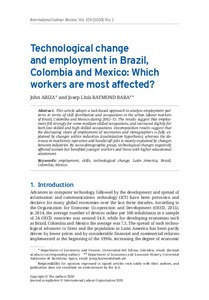Technological change and employment in Brazil, Colombia and Mexico: Which workers are most affected?

Ariza, John ; Raymond Bara, Josep Lluis
2020
159
2
June
137-159
technological change ; skill ; employment ; labour market ; urban area
Technology
https://doi.org/10.1111/ilr.12104
English
Bibliogr.
"This article adopts a task‐based approach to analyse employment patterns in terms of skill distribution and occupations in the urban labour markets of Brazil, Colombia and Mexico during 2002–15. The results suggest that employment fell strongly for some medium‐skilled occupations, and increased slightly for both low‐skilled and high‐skilled occupations. Decomposition results suggest that the decreasing share of employment of secretaries and stenographers is fully explained by changes within industries (routinization hypothesis), whereas the decrease in machinery operation and handicraft jobs is mainly explained by changes between industries. By socio‐demographic group, technological changes negatively affected women but benefited younger workers and those with higher educational attainment."
Digital;Paper
The ETUI is co-funded by the European Union. Views and opinions expressed are however those of the author(s) only and do not necessarily reflect those of the European Union or the ETUI.